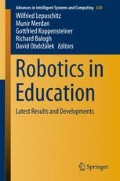Abstract
This paper describes the characteristics and methodology of a course of programming mobile robots for an Engineering course. We will describe the robot we have built for the classes, as well as the use of gamification and motivation techniques through social networks as teaching techniques. In addition, our group is committed to the open source, so we will use ROS [9] (Robotics Operating System) as the underlying technology. We will show how the motivation of the students and the exploitation of the course have improved. As a final result of this process, several students in this course got involved in the Participation in RoboCup 2016 held in Leipzig.
Access this chapter
Tax calculation will be finalised at checkout
Purchases are for personal use only
References
Belman, J., Flanagan, M.: Exploring the creative potential of values conscious design: students’ experiences with the values at play curriculum. J. Comput. Game Cult. 4(1), 57–67 (2010). Eludamos
Deterding, S.K., Nacke, L.R., Dixon, D.: Gamification: toward a definition. In: CHI 2011 Gamification Workshop Proceedings (2010)
Fernández, M.R., Revuelta, F.I., Sosa, M.J.: Redes sociales y microblogging: innovación didáctica en la formación superior. Rev. Latinoam. de Tecnología Educativa 11(1), 61–74 (2012)
Fullerton, T.: Game Design Workshop: A Playcentric Approach to Creating Innovative Games. Morgan Kaufmann, Amsterdam (2008)
Martínez, E., Raya, P.: El microblogging en el proceso de ensenanza-aprendizaje. una experiencia académica con twitter. Historia y Comunicación Social 18, 139–149 (2013)
Pérez, C., Carlos, J., et al.: Gamificación y docencia: Lo que la universidad tiene que aprender de los videojuegos. In: VIII Jornadas Internacionales de Innovacíon Universitaria Proceedings (2011)
Romero, H., Rojas, E.: La gamificación como participante en el desarrollo del b-learning: Su percepcíon en la universidad nacional, sede regional brunca. In: Eleventh LACCEI Latin American and Caribbean Conference for Engineering and Technology (LACCEI 2013) “Innovation in Engineering, Technology and Education for Competitiveness and Prosperity” Proceedings, pp. 14–16, August 2013
Zichermann, G., Linder, J.: Game-Based Marketing: Inspire Customer Loyalty Through Rewards, Challenges, and Contests. Wiley, Hoboken (2010)
Marder-Eppstein, E., Berger, E., Foote, T., Gerkey, B., Konolige, K.: The Office Marathon: robust navigation in an indoor office environment. In: International Conference on Robotics and Automation (2010)
Acknowledgment
The authors would like to thank the School of Engineering in Telecommunications of Rey Juan Carlos University, specially to his director Javier Ramos, for the support to this work, both for providing us with the laboratory equipment and for partially financing student attendance at RoboCup 2017 in Leipzig.
Author information
Authors and Affiliations
Corresponding author
Editor information
Editors and Affiliations
Rights and permissions
Copyright information
© 2018 Springer International Publishing AG
About this paper
Cite this paper
Martín, F. (2018). Open Source Robotics Course at Engineering: Infrastructure and Methodology. In: Lepuschitz, W., Merdan, M., Koppensteiner, G., Balogh, R., Obdržálek, D. (eds) Robotics in Education. RiE 2017. Advances in Intelligent Systems and Computing, vol 630. Springer, Cham. https://doi.org/10.1007/978-3-319-62875-2_19
Download citation
DOI: https://doi.org/10.1007/978-3-319-62875-2_19
Published:
Publisher Name: Springer, Cham
Print ISBN: 978-3-319-62874-5
Online ISBN: 978-3-319-62875-2
eBook Packages: EngineeringEngineering (R0)

